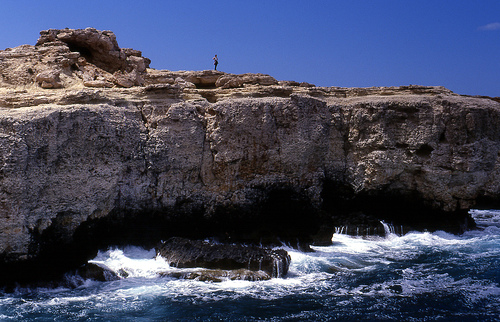Why the carbon deficit is scarier than the climate change cliff

Thomas Friedman wrote a great article called The Market and Mother Nature about the similarities and common language between the way we talk about climate change and the way we talked about the fiscal cliff. And it's true; both are these giant, hard to actually conceptualize events that the media bills as catastrophic.
But is it accurate to compare the climate change issues we're dealing with to a cliff? Are we really Wiley Coyote? When I think of the classic cartoon, he doesn't realize he's off the cliff for a bit, but when he does, reality catches up and he falls straight down to his comedic pseudo-death. I've heard similar comparisons of what we're up to on an environmental level (as well as an economic level) to a plane that has run out of gas. Both seem to posit that we'll cruise along just fine until there is a single, catastrophic, apocalyptic event where everything goes to hell.
Maybe. I appreciate the way that Friedman describes the crisis in more everyday terms, rather than sensationalizing it as a cliff. He calls it our "carbon deficit," which I think is a saddening comparison that works exquisitely well, especially because it is a word everyone can understand in their day to day lives, not just something to gawk at or fear.
Friedman's description of our "carbon deficit" is a good one. He writes, "For thousands of years up to the dawn of the industrial age 200 years ago, the Earth’s atmosphere contained 280 parts per million of the heat-trapping greenhouse gas carbon dioxide. Today, that number is nearly 400 ppm, with 450 ppm routinely cited as the tipping point where we create the conditions for out-of-control acceleration."
This concept of a deficit is more akin to something we all deal with on a day to day basis. You have your budget, but you had to get an extra birthday present for your cousin, and then the brakes needed fixing on the car and then...you get the idea. Suddenly, you're a little behind and your budget has a bit of a deficit. If you're like me, you make it up next month because you know that if you keep doing it, relentlessly, month after month, that it will ruin you.
Very few people choose to ruin themselves if there's something they can do about it, and I think we could help ourselves as a society if we change the metaphor from cliff to deficit. The role of metaphor in language, perception, and, yes, online news, is something I love. If you're interested in how deep metaphors we use influence the way we think about and perceive things, read I is an Other: The Secret Life of Metaphor and How it shapes the Way we See the World.
A deficit we can make up with the same tactic that got us here: incremental moves in a particular direction. In this case, toward 280 ppm of carbon from the current 400 ppm. But if we're moving toward the cliff like Wiley Coyote, it's too easy to say that there's nothing we can do about it. It's not in our individual control, and we might as well party like it's 1999 until we go off that cliff, and we'll deal with the free fall when we have to.
Image courtesy of m.prinke via flickr

1 comments